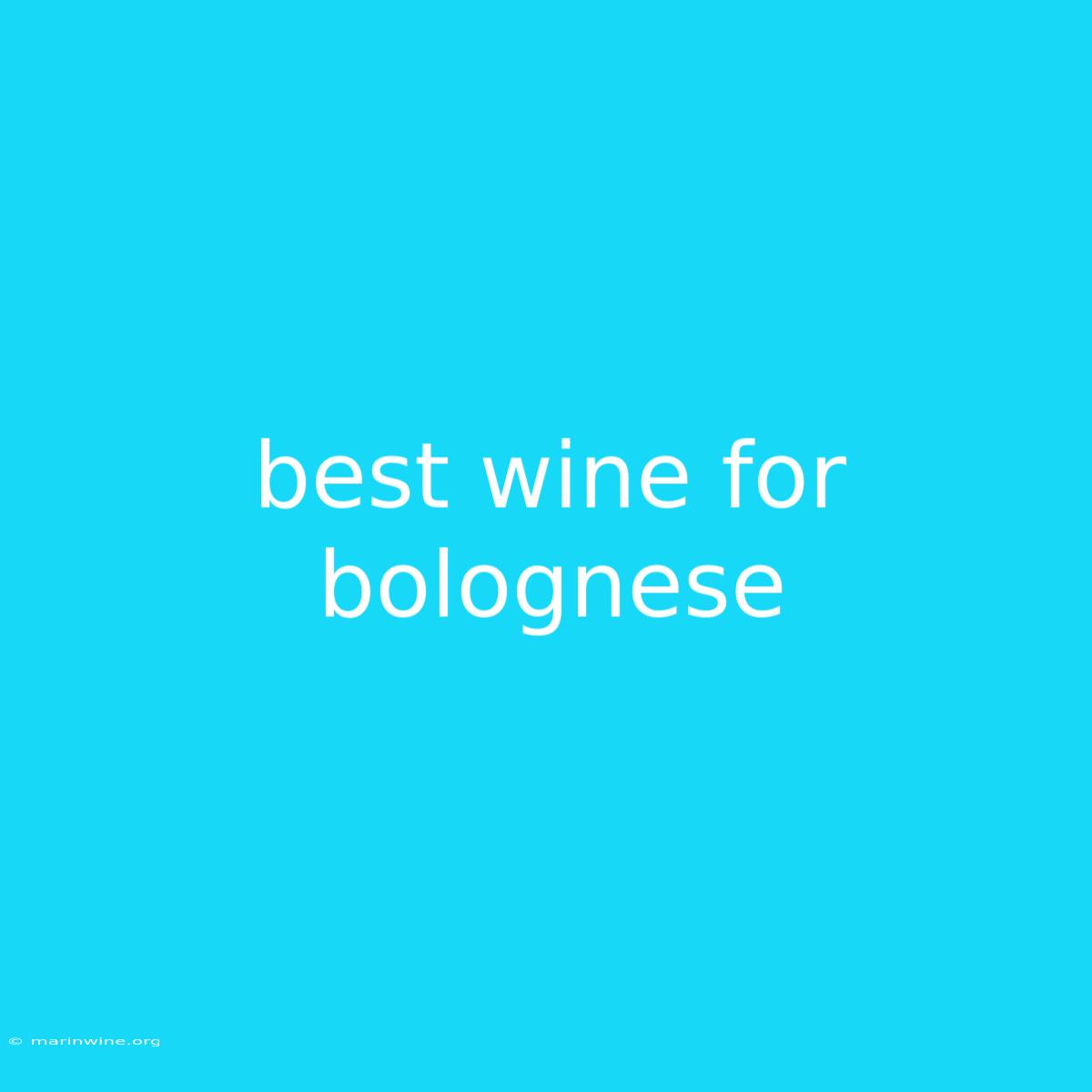The Perfect Wine Pairing for Bolognese: Unlocking the Secrets of Flavor
Have you ever wondered what wine to pair with your rich and savory Bolognese sauce? It's a common dilemma, as the complexity of this Italian classic demands a wine that can stand up to its bold flavors. Fear not, for the perfect wine pairing exists, and we're about to reveal its secrets.
Why This Matters: Choosing the right wine for Bolognese is crucial because it enhances the dining experience. The wine shouldn't overpower the sauce, but rather complement its flavors and create a harmonious balance. Understanding the nuances of both the sauce and the wine will lead to a more enjoyable and satisfying meal.
Key Takeaways of Wine Pairing for Bolognese:
| Characteristic | Wine Recommendation |
|---|---|
| Acidity | Balanced acidity to cut through the richness of the sauce |
| Tannins | Medium tannins to complement the meaty flavors |
| Body | Medium to full-bodied to match the intensity of the sauce |
| Flavor Profile | Fruit-forward, with notes of cherry, plum, or spice |
Let's dive into the world of wine pairing for Bolognese:
Understanding the Bolognese Profile:
Bolognese sauce, with its origins in Bologna, Italy, is a masterpiece of culinary artistry. Its core ingredients – ground beef, pancetta, vegetables, and red wine – create a rich, savory, and slightly sweet flavor profile. It's a dish that demands a wine with enough complexity to stand up to its boldness.
Key Aspects of Wine Selection:
1. Acidity: Bolognese is a rich sauce, and a touch of acidity in the wine is essential to cut through the heaviness and refresh the palate. Wines with balanced acidity, like Sangiovese, Barbera, or even a lighter-bodied Cabernet Sauvignon, will create a pleasant contrast.
2. Tannins: The meaty notes of Bolognese are best complemented by wines with medium tannins. These tannins, present in red wines, provide structure and a slight astringency that harmonizes with the texture of the sauce. Avoid wines with overly aggressive tannins, as they can clash with the dish.
3. Body: To match the intensity of Bolognese, a medium to full-bodied wine is the ideal choice. These wines offer a robust flavor profile that can hold its own against the rich and savory components of the sauce.
4. Flavor Profile: Opt for wines with fruit-forward flavors like cherry, plum, or even hints of spice. These notes will complement the sweetness of the tomato sauce and the savory notes of the meat, creating a delicious and balanced pairing.
Exploring Specific Wine Recommendations:
1. Sangiovese: As the native grape of the Emilia-Romagna region where Bologna resides, Sangiovese is a natural choice. Its bright acidity, medium tannins, and cherry-like flavors make it an excellent match for Bolognese.
2. Barbera: Another Italian grape varietal, Barbera, boasts higher acidity and robust tannins. Its fruit-forward flavors, often with notes of blackberry and spice, make it a bold and assertive pairing for Bolognese.
3. Cabernet Sauvignon: While Cabernet Sauvignon is more commonly associated with Bordeaux, lighter-bodied examples from California or Washington can offer a good balance of acidity, tannins, and fruitiness.
4. Pinot Noir: For a more elegant and delicate pairing, Pinot Noir can work well with Bolognese. Its lighter body and earthy notes complement the sauce without overwhelming it.
Beyond the Basics: Exploring Wine Pairing Strategies:
-
Regionality: Consider wines from the same region as the dish. Emilia-Romagna offers several excellent options beyond Sangiovese, such as Lambrusco, a sparkling red wine with notes of fruit and sweetness that can surprisingly complement Bolognese.
-
Tasting Notes: Pay attention to the tasting notes of the wine. Look for wines with descriptions of cherry, plum, spice, and earthiness. These notes will harmonize with the flavors of Bolognese.
-
Personal Preference: Ultimately, the best wine pairing is the one you enjoy the most. Don't be afraid to experiment and find what suits your palate.
FAQ for Wine Pairing with Bolognese:
Q: Can I use white wine for Bolognese?
A: While traditional Bolognese recipes call for red wine, using a white wine with high acidity, like Sauvignon Blanc or Pinot Grigio, can create a refreshing counterpoint to the richness of the sauce. However, the traditional pairing with red wine is generally more harmonious.
Q: What about sparkling wine?
A: A light-bodied sparkling wine, like Prosecco or Lambrusco, can surprisingly work well with Bolognese. The bubbles cleanse the palate and provide a touch of acidity that cuts through the richness of the sauce.
Q: Should I use the same wine for cooking and drinking?
A: While it's not mandatory, using the same wine for both cooking and drinking can create a more cohesive dining experience. However, you can choose a different wine for drinking if you prefer a slightly different flavor profile.
Tips for Selecting the Best Wine for Bolognese:
- Consider the ingredients: The richness and intensity of Bolognese will guide your wine selection.
- Read the wine label: Pay attention to the grape varietal, region, and tasting notes.
- Don't be afraid to experiment: Try different wines to discover your preferred pairing.
Summary: Pairing the right wine with Bolognese is an art, not a science. By understanding the key aspects of both the sauce and the wine, you can create a harmonious balance that elevates your dining experience. Whether you choose a classic Sangiovese or explore a more adventurous option like Lambrusco, let your palate be your guide and enjoy the perfect marriage of flavors.

